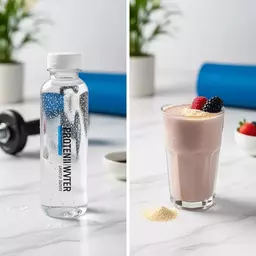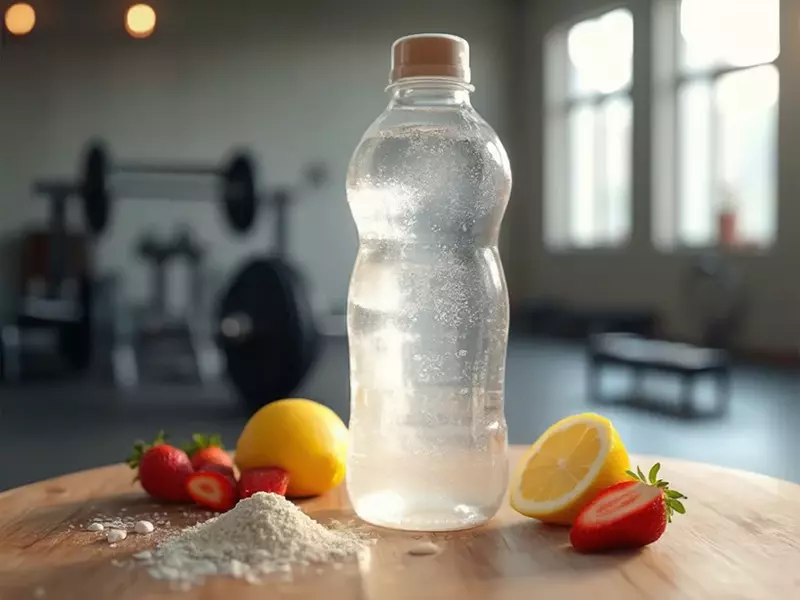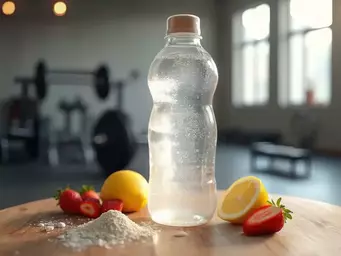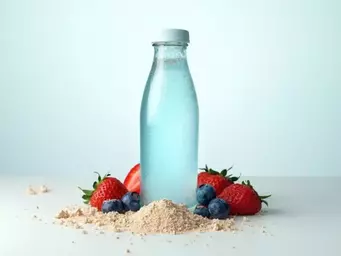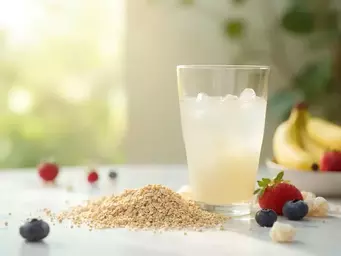Post-Workout Protein Water Guidelines

Are you ready to transform your post-workout recovery? Learn how the unique benefits of protein water can elevate your hydration strategy and optimize your muscle recovery!
What You Will Learn
- Protein water combines hydration with essential nutrients to aid in post-workout recovery.
- Essential amino acids like leucine, isoleucine, and valine play a vital role in muscle repair and growth.
- Consuming protein water within 30-60 minutes after a workout maximizes recovery benefits.
- Balancing protein intake with carbohydrates enhances glycogen replenishment and supports overall recovery.
The Power of Protein Water: Key Aspects for Optimal Recovery
Protein water is a strategic choice for post-workout recovery, offering a blend of hydration and essential nutrients. The visual below highlights its core benefits and integration into a balanced fitness regimen.
Essential Amino Acids (EAAs)
- 1 Leucine: Muscle Protein Synthesis
- 2 Isoleucine: Energy Regulation
- 3 Valine: Muscle Metabolism & Repair
Integrating Protein Water & Carbs
Combine protein water with carbs to replenish glycogen stores for improved recovery.
- ● Protein Water + Banana
- ● Protein + Oatmeal
- ● Protein Water + Whole-grain Toast
Understanding the Role of Protein Water in Post-Workout Recovery
After a workout, your body craves the right nutrients to kickstart recovery, and that's where protein water comes into play. This innovative drink combines hydration with essential nutrients, making it a fantastic option for anyone serious about their fitness journey. Have you ever tried sipping on a refreshing bottle of protein water after hitting the gym? If not, you're missing out on a delicious way to recover!
Protein water isn't just water with a sprinkle of protein; it’s a carefully crafted beverage that delivers hydration and necessary nutrients in one convenient package. Whether you're a fitness beginner or a seasoned athlete, understanding how protein water supports recovery can elevate your post-workout strategy.
What Is Protein Water and How Does It Support Recovery?
Protein water is a beverage infused with protein, often derived from sources like whey or plant proteins. It's designed to help replenish what your body loses during exercise while also promoting muscle recovery. The combination of hydration and protein makes this drink a game-changer for those looking to optimize their recovery process.
- Hydration: Keeps you replenished after sweating it out
- Protein: Aids in muscle repair and growth
- Convenience: Easy to consume on-the-go
By choosing protein water, you’re not only quenching your thirst but also fueling your muscles with the necessary building blocks for recovery. It’s a fantastic choice to consider alongside your regular hydration routine!
The Science Behind Protein’s Role in Muscle Repair and Growth
When you exercise, especially with strength training, tiny tears occur in your muscle fibers. This sounds alarming, but don't worry! Your body is built to handle this. Enter protein, the superhero of muscle repair! Protein helps rebuild these fibers, making them stronger and more resilient over time. Research published in Frontiers in Nutrition further highlights how adequate protein intake, particularly from sources rich in essential amino acids, significantly contributes to muscle protein synthesis and overall recovery.
The science behind muscle repair lies in the amino acids that protein provides. These amino acids are the building blocks of protein and play a pivotal role in muscle recovery and growth. Consuming protein water post-workout ensures that your body gets the right nutrients it needs to kickstart this healing process.
Essential Amino Acids: Key Players in Muscle Recovery
Among the various components of protein, essential amino acids (EAAs) are critical for muscle recovery. Unlike non-essential amino acids, your body can't produce these on its own, so you must obtain them through your diet. The most notable EAAs for muscle recovery include leucine, isoleucine, and valine. A study in the Journal of Exercise Science & Fitness emphasizes the importance of these specific amino acids in promoting muscle protein synthesis and reducing exercise-induced muscle damage.
- Leucine: Stimulates muscle protein synthesis
- Isoleucine: Helps with energy regulation
- Valine: Supports muscle metabolism and repair
Incorporating protein water into your post-workout routine can ensure you’re getting these essential amino acids, setting you up for success in your recovery journey. Remember, every sip counts when you're aiming to enhance your hydration and fitness goals!
Pro Tip
To maximize the benefits of protein water, consider pairing it with a source of carbohydrates, such as a banana or a slice of whole-grain toast. This combination not only aids in muscle recovery but also helps replenish glycogen stores, ensuring you bounce back stronger for your next workout!
Frequently Asked Questions About Protein Water and Recovery
What is protein water?
How does protein water help with muscle recovery?
When should I consume protein water for optimal recovery?
Why are essential amino acids (EAAs) important?
Should I combine protein water with carbohydrates?
Summarizing Key Takeaways for Optimal Protein Water Consumption
As we wrap up our discussion on protein water, it's essential to highlight the key takeaways that can enhance your post-workout recovery. Integrating protein water into your routine is not just a matter of taste—it's about making informed choices that align with your fitness goals. By harnessing the benefits of protein water, you can significantly improve your hydration and recovery strategies.
First and foremost, remember that protein water is a convenient way to get the nutrients your body craves after a workout. It’s not just about the protein; it’s about how it fits into your overall post-exercise routine. Here are a few tips to keep in mind:
- Choose a protein water that suits your taste and needs.
- Drink within 30-60 minutes post-workout for optimal recovery benefits.
- Consider your overall dietary intake to balance your protein consumption.
Integrating Protein Water into Your Post-Workout Routine
To effectively integrate protein water into your post-workout routine, think about timing and consistency. Consuming protein water immediately after exercise can aid in muscle repair and replenish lost fluids. This can be particularly beneficial after intense workouts or long training sessions.
Additionally, I recommend keeping your favorite protein water options handy—whether it's in your gym bag or at home—so you never miss a post-workout opportunity. Don’t forget to experiment with different flavors and brands to find what works best for you!
Encouraging Balanced Recovery: The Role of Protein and Carbohydrates
While protein is crucial for muscle recovery, it’s also important to consider carbohydrates in your post-workout nutrition. Combining protein water with a source of carbohydrates can help replenish glycogen stores and improve recovery. The National Center for Biotechnology Information (NCBI) highlights how this combination is key for optimizing post-exercise physiological adaptation.
Here’s a quick list of ideal pairings:
- Protein water with a banana or other fruit.
- A scoop of protein powder mixed with oatmeal.
- Protein water alongside a slice of whole-grain toast.
By balancing your intake of protein and carbohydrates, you'll support your body’s recovery process more effectively. This approach helps you bounce back stronger and ready for your next workout!
Assessing Your Recovery Time and Adjusting Your Intake Accordingly
Every athlete has unique recovery needs, and understanding your body can help you determine the right amount of protein water to consume. For those who engage in high-intensity workouts, a greater protein intake may be necessary compared to lighter exercise routines. Keep an eye on your recovery time and adjust your protein water consumption as needed.
It might be helpful to track your workouts and recovery periods. This way, you can see patterns in how your body responds and fine-tune your post-exercise hydration and nutrition strategy accordingly!
Next Steps: Optimize Your Recovery Strategy Today
Now that we've covered the essentials of protein water and its role in your recovery, it's time to take actionable steps to optimize your strategy. Let’s dive into the next steps that can enhance your hydration and recovery experience.
Start Tracking Your Protein Water Intake and Adjust According to Your Needs
Keeping track of your protein water intake is a fantastic way to ensure you're meeting your recovery goals. Consider using an app or a simple journal to log your daily consumption. This method makes it easier to spot trends and make adjustments as necessary. If you find yourself feeling fatigued or not recovering as expected, you might need to increase your intake!
Engage with a Community: Share Your Experiences and Learn from Others
Finally, don’t underestimate the power of community. Engaging with fellow fitness enthusiasts can provide valuable insights and motivation. Join forums, participate in online groups, or follow fitness influencers who share similar interests. Sharing your experiences with protein water and learning from others can open up new possibilities for improving your hydration strategies.
Ready to take charge of your recovery journey? With these tips, you can optimize your protein water consumption and elevate your post-workout routine!
Recap of Key Points
Here is a quick recap of the important points discussed in the article:
- Protein water combines hydration with essential nutrients, aiding in post-workout recovery.
- It replenishes lost fluids and provides protein necessary for muscle repair and growth.
- Consume protein water within 30-60 minutes after exercise for optimal recovery benefits.
- Incorporate essential amino acids, like leucine, isoleucine, and valine, to enhance muscle recovery.
- Balancing protein intake with carbohydrates can improve recovery and replenish glycogen stores.
- Track your protein water intake and adjust according to your individual recovery needs.


